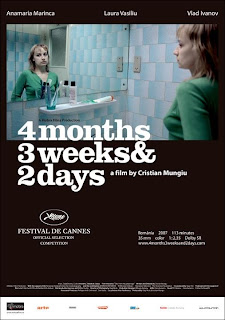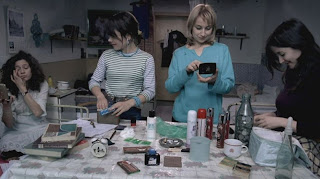 Director: Cristian Mungiu
Director: Cristian MungiuScreenwriter: Cristian Mungiu
Certificate: 15
Running Time: 113 minutes
Release Date: 11 January
Like other recent Cannes winners of the Palme d’Or, particularly the 2005 recipient L’Enfant, this Romanian abortion story, bleakly titled 4 Months, 3 Weeks & 2 Days, is a test of today’s cineastes abilities to appreciate European art cinema. Is it possible that the most enjoyable Palme d’Or winner since Pulp Fiction was Farenheit 9/11? Cannes juries have been in bleak moods for a while now, but their verdicts are consistently intriguing. 4 Months… was the surprise winner, beating out early favourite The Diving Bell and the Butterfly, a film about a stroke victim who is completely paralyzed except for one eyelid. Having now seen both films, I can say that against 4 Months, Diving Bell feels about as much fun as Pee Wee’s Big Adventure.
4 Months, 3 Weeks & 2 Days, as you may have figured, is the gestation time of an unwanted foetus, specifically the one growing inside of slender college student Gabita (Laura Vasiliu) in 1987 Romania. With the help of her friend Otilia (Anamaria Marinca), an illegal procedure is arranged to terminate the pregnancy. And if you thought that getting a black market abortion in 80s Romania was easy as pie, you’re in for a harsh reality check. Mr. Bebe (Vlad Ivanov), the man enlisted to carry out the procedure, is no Vera Drake, and demands far more than imagined from the vulnerable girls for his services. Much of the action follows the efforts  of Otilia, who takes as much risks and suffers nearly as much as her ailing friend as she struggles to see her friend through the abortion while managing to slip out for a family dinner at her beau’s home. The actress, Anamaria Marinca, delivers a monumentally fearless performance, coping with both corporeal and psychological danger from all angles.
of Otilia, who takes as much risks and suffers nearly as much as her ailing friend as she struggles to see her friend through the abortion while managing to slip out for a family dinner at her beau’s home. The actress, Anamaria Marinca, delivers a monumentally fearless performance, coping with both corporeal and psychological danger from all angles.
 of Otilia, who takes as much risks and suffers nearly as much as her ailing friend as she struggles to see her friend through the abortion while managing to slip out for a family dinner at her beau’s home. The actress, Anamaria Marinca, delivers a monumentally fearless performance, coping with both corporeal and psychological danger from all angles.
of Otilia, who takes as much risks and suffers nearly as much as her ailing friend as she struggles to see her friend through the abortion while managing to slip out for a family dinner at her beau’s home. The actress, Anamaria Marinca, delivers a monumentally fearless performance, coping with both corporeal and psychological danger from all angles.Director Cristian Mungiu claims to have based this film on a true story told to him some 15 years ago which he has never been able to shake. His cinematic style is that of realism, with epic takes shot mostly with a hand-held camera and natural sound, feeling similar to cinematographer Oleg Mutu’s 2005 film The Death of Mr. Lazarescu. If these recent films are any indication, Eastern European cinema is quite certainly experiencing another new wave, which is exciting; the world could use another batch of filmmakers like Kieslowski, Andzej Wajda, and Milos Forman. Without making a political statement about the terrors of the Ceausescu regime, Mungiu’s completely immersing narrative delivers an intensely anxious experience of the fear of knowing that the only way out is a hellish nightmare that will leave eternal emotional disfigurement. This is no easy film, but it offers stirring and challenging engagement for the audience.




No comments:
Post a Comment